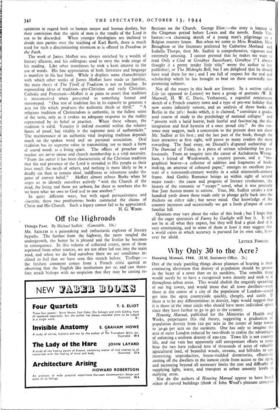Off the Highroads
Things Past. By Michael Sadleir. (Constable. 10S.) MR. SADLEIR is a painstaking and enthusiastic explorer of literary bypaths. The further from the highway, the more tangled the undergrowth, the better he is pleased and the livelier he becomes. in consequence. In this volume of collected essays, most of them reprinted from other sources, we are not often led out into the main road, and when we do find ourselves there we are sometimes in- clined to feel that we have seen this stretch before. Trollope the freshest comment comes from a French critic quoted as observing that the English like institutions per se, and can there- fore attack bishops with no suspicion that they may be casting re- flections on the Church. George Eliot : —the story is limited to the Chapman period before Lewes and the novels. Emile Ver- . haeren : —a charming sketch of a young man's pilgrimage to a Belgian country house. But. when we come to Miss Braddon, Miss Broughton or the literature preferred by Catherine Morland and Isabella Thorpe, then Mr. Sadleir is comprehensive, vigorous and extremely amusing. I cannot pretend that he makes me want to read Only a Clod or Goodbye Sweetheart, Goodbye ' ("I always thought it a pretty tender little title," wrote the author to her publisher), or The Midnight Bell, but I am delighted tjaat he should have read them for me ; and I am full of respect for the zeal and scholarship which he has brought to bear on these outwardly un- promising subjects.
Not all the essays in this book are literary. In a section called Life (as opposed to Letters) we have a group of portraits (W. B. Maxwell, H. W. C. Davis, Verhaeren), a regretful reminiscent sketch of a French country town and a type of pre-war holiday that now seems infinitely remote, and an analysis of three books on Berlin in the zo's: books which, it is claimed, " constitute a gradu- ated course of study in the psychology of national collapse " and " present with a lurid horror, both fearful and fascinating, the dis- integration and final hysteria of a once proud city." As this sen- tence may suggest, such a concession to the present does not show Mr. Sadleir at his- best ; and the last part of the book, though the least attractive at first sight, will prove to many readers the most rewarding. The final essay, on Disraeli's disputed authorship of The Dunciad of Today, is a piece of serious scholarship for pro- fessionals. From an enquiry into the career of Archdeacon Wrang- ham, a friend of Wordsworth, a country parson, and a " bio- graphical beaver—a collector of oddities and fragments of book- making, an amateur of coloured paper," emerges an excellent por- trait of a nineteenth-century worthy in a solid nineteenth-century frame. And Gothic Romance brings us within sight of several major roads : the cause and progress of literary revolutions, the history of the romantic or " escape " novel, what it was precisely that Jane Austen meant to satirise. True, Mr. Sadleir strides a few hundred yards down these roads only to plunge gaily back into the thickets on either side ; but never mind. Our knowledge of the country increases and occasionally we get a fresh glimpse of some familiar. hill.
Opinions may vary Pout the value of this book ; but I hope that all the eager spectators of Fanny by Gaslight will buy it. It will not be at all what they expect, but they will find a great deal of it very entertaining, and to some of them at least it may suggest that a world exists in which accuracy is pursued for its own sake, how- ever far afield.
LETTICE FOWLER.


























 Previous page
Previous page